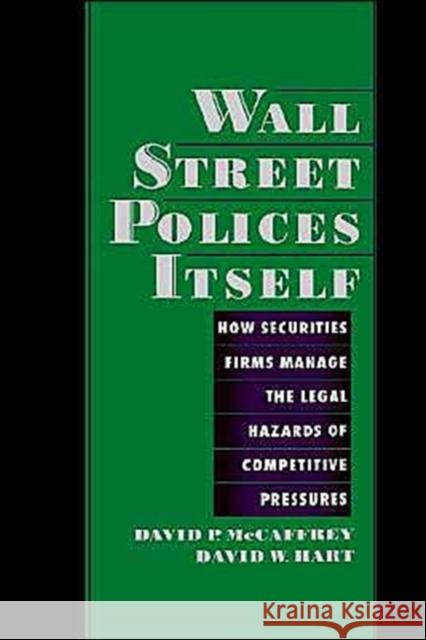Wall Street Policies Itself: How Securities Firms Manage the Legal Hazards of Competitive Pressures » książka
Wall Street Policies Itself: How Securities Firms Manage the Legal Hazards of Competitive Pressures
ISBN-13: 9780195111873 / Angielski / Twarda / 1998 / 224 str.
Wall Street Polices Itself: How Securities Firms Manage the Legal Hazards of Competitive Pressures explains how the self-regulatory system for U.S. securities firms works within three tiers of supervision. Overseeing the whole system is the U.S. Securities and Exchange Commission, which directly supervises such self-regulatory organizations as the New York Stock Exchange and the National Association of Securities Dealers. In turn, these organizations oversee the broker-dealer firms that conduct the daily business of buying and selling securities. The system relies heavily on the firms' internal supervisory systems to prevent violations of securities laws, since they are in the best position to track their own internal activities. Firms may be fined, or subjected to much more stringent penalties, if their supervisory systems fail.
A widely shared perception is that this sort of securities self-regulation does fail--often and repeatedly. Public investigations, press reports, books like Liar's Poker and Den of Thieves, and such films as Wall Street have hammered broker-dealer firms relentlessly since the early 1980s. However, the surprising truth is that we do not really know what transpires in the regulatory operations of firms like Merrill Lynch or Salomon Smith Barney because the well-publicized failures tell only part of the story. David P. McCaffrey and David W. Hart provide readers with a fuller picture by offering an in-depth examination of how this regulatory system works, the types of regulatory problems that broker-dealer firms encounter, why some firms have more problems than others, and what experiences with the system can suggest about how to improve self-regulatory systems in general. Drawing extensively upon prior work on securities regulation in the areas of economics, law, and management, this book will greatly interest professionals in the securities industry and those in business regulation generally, and will also appeal to students of corporate strategy and culture, of legal and social issues in management, and of regulation.










